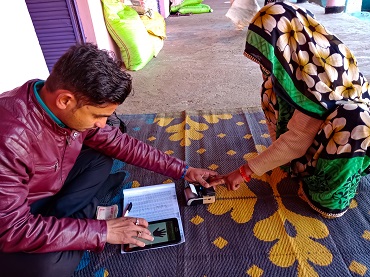Blog
Thriving Amid Chaos

A virtual roundtable summary.
The Chinese word for "crisis" is composed of two Chinese characters. The first character means "danger" and the second "opportunity". Not a lot of organizations have been able to look at the COVID-19 crisis as an opportunity and thrive under the current circumstances. Nonetheless, some are indeed thriving and growing.
As part of a weekly webinar series on COVID-19 mitigation efforts, the SME Finance Forum hosted a virtual roundtable on SME Finance Businesses Thriving amid Chaos. The panel was hosted and moderated by Matthew Gamser (IFC) with Patrycja Strzelecka (CashDirector), Vitaliy Abayev (Shanghai Fang Fu Tong Technologies Co – F-Road), Ankur Mehrotra (Grab Financial Service) and Dimitry Oosthoek (Topicus Finance) sharing their knowledge and experiences on how the COVID-19 crisis has been an opportunity for their businesses to prosper.
Unlike many businesses in the midst of the COVID crisis, some SME finance businesses and Fintechs are thriving as demands to digitize have increased enormously with the need to social distance and with lockdowns restricting, if not stopping completely in-person financial operations. For instance, CashDirector is forecasting a potential growth for the company in the upcoming months as demand has spiked for its Digital CFO platform for SMEs as banks can offer it as an addon to online banking, keeping these clients within the banks’ ecosystem as the SMEs manage their finances with this product. Banks have been gaining additional visibility through the digital solutions CashDirector has been offering, thus increasing their activity. As Patrycja stated, “Crisis is an opportunity for us going forward as a provider of digital solutions with banks”. CashDirector is one among many instances of success during the crisis. F- Road in China has also been performing particularly well during the past few months, as they also provide services to the financial sector that are in rising demand. Vitaliy explained that banks have changed their attitude to digital and online as a result of this crisis which has been an advantage to enterprises who had already started digitalization processes. It also looks like this crisis is shining a light on the gaps in digitization where digitalization had already taken place and therefore, there is some opportunity for players such as F-Road to fill those gaps as digital channels and processes are being integrated now more than ever.
Another domain where demand has risen exponentially is food delivery. A part of Grab Financial Services is Grab delivery where activity has more than tripled according to Ankur. He also shed light on the fact that there are areas of opportunity such as how to help SMEs get online so that they can survive the lockdown. Grab Financial Services is pivoting to focus on getting SMEs online and accessing markets with things such as online payment solutions and linking them to delivery solutions. And Topicus, a tech provider of solutions for local government, healthcare, education, and finance, has seen the usage of their solutions skyrocket across many of the sectors they support. With their education division for example, the usage of their technology has already hit their 2025 goals as Dutch students are using their solution for online school. In their financial services division, the platform used by banks for investments has seen transactions triple since the crisis began. Dimitry noted that now is a time to focus on basics and what really matters in order to be responsive to client needs as they respond to the crisis.
However, there are concerns regarding the role of regulators in the ubiquity and ability of “going digital” across markets. Ankur commented that they have been observing regulators’ indicating more tolerance to go digital such as for eKYC for example and that COVID has accelerated these conversations in many markets. In the Netherlands, a highly regulated country despite the government implementing better acceptance criteria, it is still uncertain how regulators will respond in the push to digital.
In contrast, Chinese regulators have been much more cautious. Indeed, regulations are getting tighter but online monitoring and digitalization of each stage of the credit cycle are actually making clients present all types of proof online, increasing transparency and visibility. In general, and all around the world, transparency is more important than ever during the COVID-19 crisis. As Patrycja mentioned during the discussion, past performance is no longer a sufficient indicator of performance for granting loans so lending institutions will need improved visibility into an SME’s existing and cash flow and transactions to have the information they need to make decisions, making the case for transparency and real-time data. Of course, loosening regulations right now could cause more damage than good so any regulatory changes will need to be watched. Nevertheless, in general, there has been more tolerance from the side of regulators to support digitalization due to the COVID-19 crisis.
A number of opportunities present themselves in the near to mid-term for the presenting companies and others similar to them. Whether it is facilitating real-time data collection, providing online market access, expanding online banking processes, online integration, or developing models using artificial intelligence to increase efficiency, demand for these solutions will continue to increase and allow some players to thrive in the face of the COVID crisis.
***
If you are a member of the SME Finance Forum, you can access the slides and the recording in this link.







































